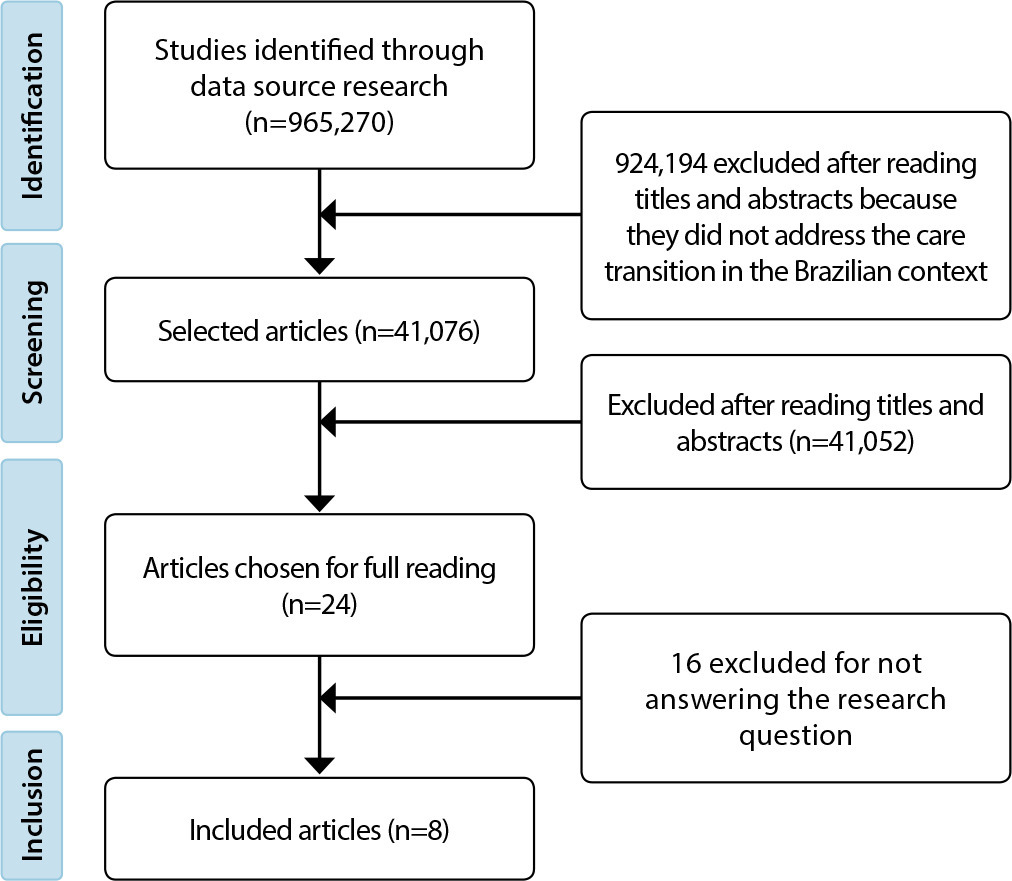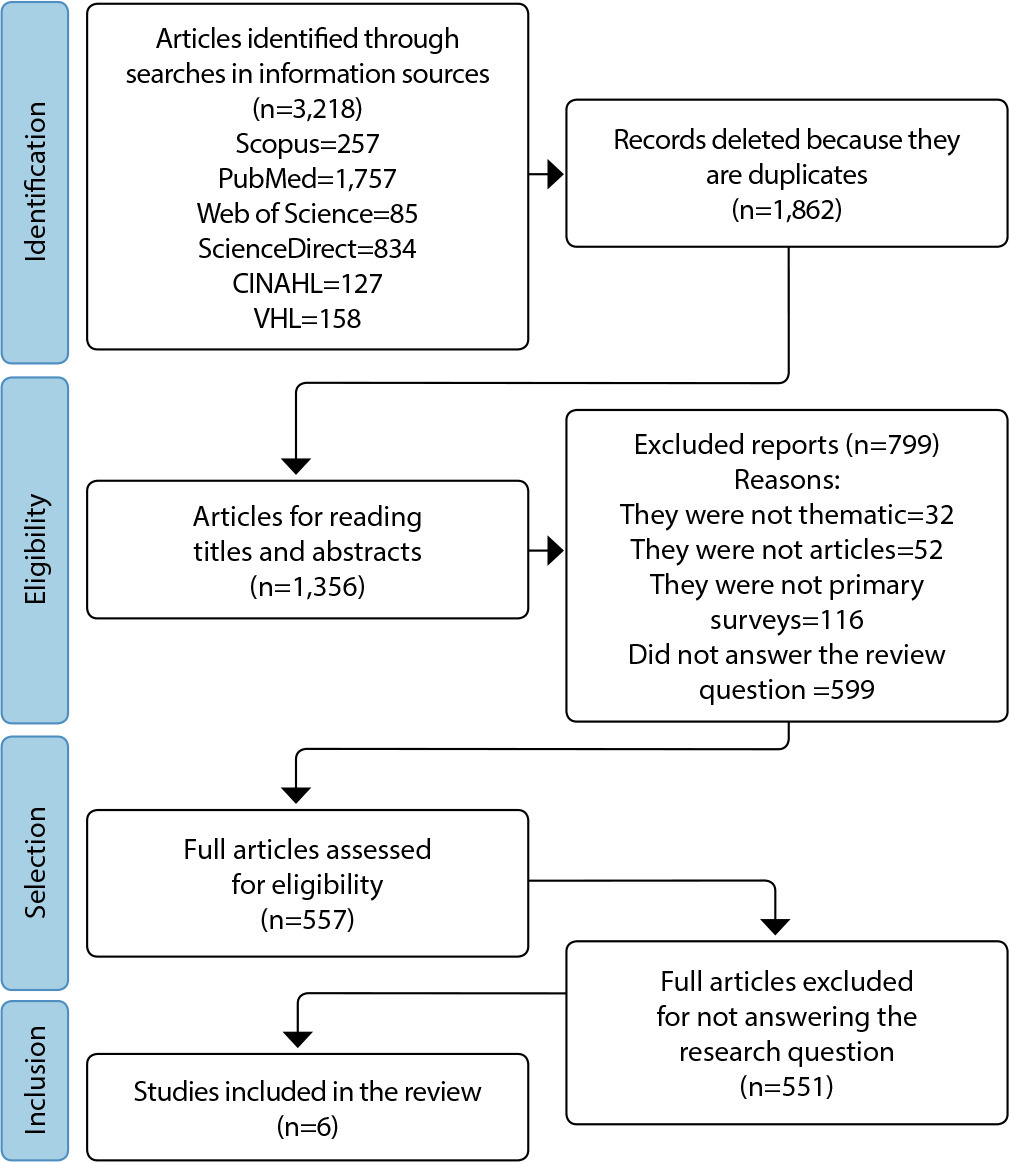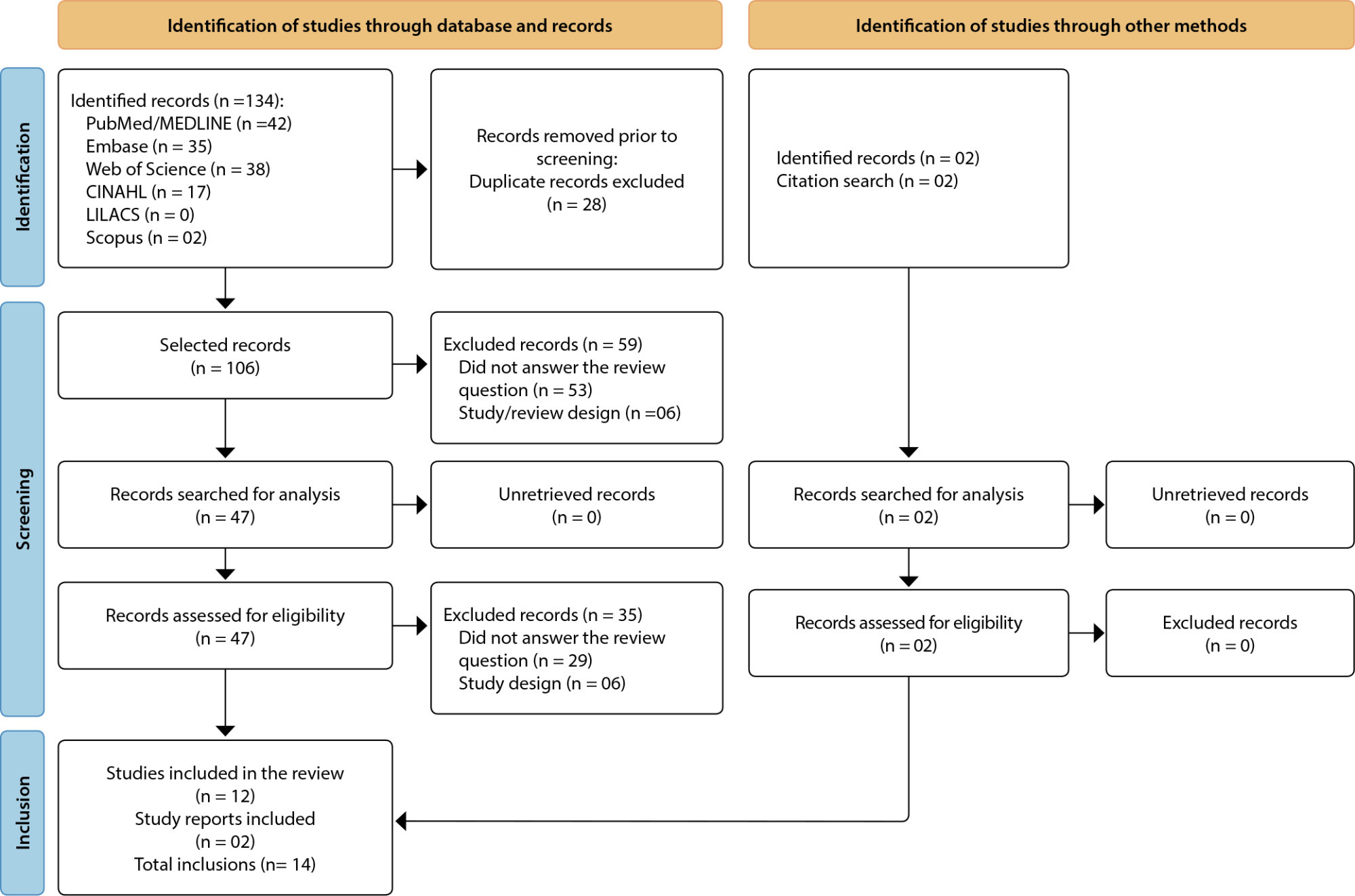-
ORIGINAL ARTICLE
Effect of cardiovascular biofeedback on nursing staff stress: a randomized controlled clinical trial
Revista Brasileira de Enfermagem. 2023;76(6):e20230069
12-04-2023
Abstract
ORIGINAL ARTICLEEffect of cardiovascular biofeedback on nursing staff stress: a randomized controlled clinical trial
Revista Brasileira de Enfermagem. 2023;76(6):e20230069
12-04-2023DOI 10.1590/0034-7167-2023-0069
Views0See moreABSTRACT
Objective:
to assess the effect of cardiovascular biofeedback on nursing staff stress when compared to an activity without self-monitoring.
Method:
a randomized controlled clinical trial, carried out with nursing professionals from a university hospital. The intervention group (n=58) performed cardiovascular biofeedback, and the control (n=57) performed an online puzzle without self-monitoring, totaling nine meetings over three weeks. The outcome was assessed using the Stress Symptoms and Work-Related Stress scales, and the biological marker heart rate variability. The generalized estimating equations method was used.
Results:
the intervention had no effect on self-reported instruments (p>0.050). However, there was an effect of time (p<0.050) on all heart rate variability indicators, demonstrating changes over the sessions.
Conclusion:
cardiovascular biofeedback showed promising results in the biological marker, suggesting that it can be used in nursing staff as a complementary therapy by promoting better autonomic nervous system regulation.

-
Transition of Care for Individuals with Mental Disorders in Brazil: A Contextual Analysis
Revista Brasileira de Enfermagem. 2023;76(6):e20230063
12-04-2023
Abstract
Transition of Care for Individuals with Mental Disorders in Brazil: A Contextual Analysis
Revista Brasileira de Enfermagem. 2023;76(6):e20230063
12-04-2023DOI 10.1590/0034-7167-2023-0063
Views0See moreABSTRACT
Objective:
To describe the contexts of care transition for individuals with mental disorders in the Brazilian setting.
Methods:
A contextual analysis was conducted through a scoping review. The search for studies was conducted in databases and thesis and dissertation portals, and the analysis was based on immediate, specific, general, and meta-contexts.
Results:
The sample, consisting of eight studies, indicated that the following factors are present in the contexts where care transition occurs: Peculiarities of care transition for individuals with mental disorders; Perspectives that can strengthen or weaken this transition; Approaches proposed in the past for the development of care transition; and Elements related to Brazilian legislation.
Final Considerations:
It is observed that the transition of care for individuals with mental disorders in Brazil takes place in various contexts of care levels. These variations present significant potentials and barriers in the care scenarios.

-
ORIGINAL ARTICLE
Sexual behavior according to undergraduate students: perspective of cross-cultural nursing and intersectional framing
Revista Brasileira de Enfermagem. 2023;76(6):e20220786
12-04-2023
Abstract
ORIGINAL ARTICLESexual behavior according to undergraduate students: perspective of cross-cultural nursing and intersectional framing
Revista Brasileira de Enfermagem. 2023;76(6):e20220786
12-04-2023DOI 10.1590/0034-7167-2022-0786
Views0ABSTRACT
Objective:
to discuss undergraduate students’ sexual behavior from the perspective of social markers and cross-cultural care proposed by Madeleine Leininger.
Methods:
descriptive-exploratory qualitative research, with a theoretical-philosophical foundation in the Transcultural Theory. Convenience sample was composed of 57 young people from two universities in Rio de Janeiro. The focus groups’ content were analyzed lexically using the IRAMUTEQ software.
Results:
four classes emerged: Young people’s sexual scripts: between the fear of an unplanned pregnancy and the risk of exposure to sexually transmitted infections; Affective relationships: trust in steady sexual partners, apparent sense of security and disuse of condoms; Sexual practices, gender and cultural determinants: distinction in men’s and women’s role; Sexual partnerships, negotiation of condom use and vulnerability to sexually transmitted infections.
Final considerations:
challenges are perceived for the attention to undergraduate students’ sexual health, who verbalized risky sexual behaviors due to sociocultural vulnerabilities.
Keywords:Cross-Cultural NursingIntersectional FramingSexual BehaviorSexually Transmitted InfectionsYoung AdultSee more
-
Sleep quality of nurses who worked in coping with COVID-19: an integrative review
Revista Brasileira de Enfermagem. 2023;76(6):e20230007
12-04-2023
Abstract
Sleep quality of nurses who worked in coping with COVID-19: an integrative review
Revista Brasileira de Enfermagem. 2023;76(6):e20230007
12-04-2023DOI 10.1590/0034-7167-2023-0007
Views0See moreABSTRACT
Objective:
to analyze sleep quality of nurses who worked coping with COVID-19 in scientific evidence.
Methods:
an integrative review, carried out in seven databases, including studies between December 2021 and June 2022, without language restrictions. The sample consisted of 15 primary studies.
Results:
nurses working in hospital, intensive care, outpatient care and teaching institutions constitute a vulnerable group for sleep disorders: latency, duration, efficiency and quality. The disorders identified involved insomnia at varying levels of severity: daytime dysfunction and morning sleepiness. Night work and low capacity for self-care were determinants of impaired sleep patterns.
Final considerations:
the COVID-19 pandemic contributed to greater vulnerability of nurses to changes in sleep, requiring strategies for risk management and well-being promotion.

-
ORIGINAL ARTICLE
Work and Mental Distress among Nurses in the Amazon Region of Brazil during the COVID-19 Pandemic
Revista Brasileira de Enfermagem. 2023;76(6):e20220792
12-04-2023
Abstract
ORIGINAL ARTICLEWork and Mental Distress among Nurses in the Amazon Region of Brazil during the COVID-19 Pandemic
Revista Brasileira de Enfermagem. 2023;76(6):e20220792
12-04-2023DOI 10.1590/0034-7167-2022-0792
Views0See moreABSTRACT
Objective:
To assess the relationship between psychopathological symptoms and the social, clinical, and occupational profile of nurses in the Amazon region of Brazil during the COVID-19 pandemic.
Methods:
A descriptive cross-sectional online study was conducted in 2020 with 261 nurses. The Symptom Assessment Scale-40 was utilized.
Results:
The presence of pre-existing conditions before the pandemic was associated with psychotism (p=0.044). Experiencing constraints and/or violence at work during the pandemic was associated with somatization (p=0.025), and working hours were associated with anxiety (p=0.025). Nurses predominantly exhibited symptoms related to fear (33.7%), tension (34.5%), and a sense that something is wrong in the mind (22.6%).
Conclusions:
A significant association was observed between working hours and anxiety symptoms, the experience of constraints and/or violence at work during the COVID-19 pandemic and somatization symptoms, as well as between pre-existing conditions and psychotism symptoms related to COVID-19.
-
Simulation training of caregivers at hospital discharge of patients with chronic diseases: an integrative review
Revista Brasileira de Enfermagem. 2023;76(6):e20230043
12-04-2023
Abstract
Simulation training of caregivers at hospital discharge of patients with chronic diseases: an integrative review
Revista Brasileira de Enfermagem. 2023;76(6):e20230043
12-04-2023DOI 10.1590/0034-7167-2023-0043
Views0See moreABSTRACT
Objective:
to identify evidence about the use and effects of clinical simulation for preparing caregivers for discharging patients with chronic conditions.
Methods:
an integrative peer review in the Scopus, PubMed, Web of Science, Cumulative Index to Nursing and Allied Health Literature, ScienceDirect and Virtual Health Library databases, from July to September 2022.
Results:
3,218 studies were identified, with a final sample consisting of four national and two international articles. Using simulation as an educational technology contributed to caregiver preparation in home care. In most studies, using clinical simulation included using other strategies to complement training: expository dialogued class, conversation circle and audiovisual resources.
Final considerations:
simulation proved to be efficient for training caregivers, with the active participation of family members and nurses in health education actions.

-
ORIGINAL ARTICLE
Feelings about birth by a group of high-risk pregnant women
Revista Brasileira de Enfermagem. 2023;76(6):e20230059
12-04-2023
Abstract
ORIGINAL ARTICLEFeelings about birth by a group of high-risk pregnant women
Revista Brasileira de Enfermagem. 2023;76(6):e20230059
12-04-2023DOI 10.1590/0034-7167-2023-0059
Views0See moreABSTRACT
Objective:
to understand feelings about birth among a group of high-risk pregnant women.
Method:
a descriptive and qualitative study, using Alfred Schütz’s social phenomenology as a philosophical theoretical framework. The study included 25 pregnant women undergoing high-risk prenatal care. The interview had the following guiding questions: tell me about your feelings regarding the moment of birth/childbirth; How do you deal with the high-risk diagnosis? What are your expectations for birth/childbirth?
Results:
five categories emerged: Fear of obstetric care; Fear of complications with the baby; Fear of cesarean section; Resilience in the face of high-risk pregnancy; and Expectations for birth.
Considerations:
high-risk pregnant women are afraid of the care they will receive, the risks and concern about the baby’s vitality at birth. The importance of care is emphasized, with a welcoming environment, bonding and communication between health team and pregnant woman.
-
ORIGINAL ARTICLE
Mental health profile of the elderly community: a cross-sectional study
Revista Brasileira de Enfermagem. 2020;73(1):e20180191
02-10-2020
Abstract
ORIGINAL ARTICLEMental health profile of the elderly community: a cross-sectional study
Revista Brasileira de Enfermagem. 2020;73(1):e20180191
02-10-2020DOI 10.1590/0034-7167-2018-0191
Views0See moreABSTRACT
Objective:
to describe the mental health profile of the elderly registered in a Family Health Unit in the city of Recife, Pernambuco State.
Method:
it was a descriptive quantitative study, conducted with 159 elderly through the scales Geriatric Depression, Resilience, Social Support, Life Satisfaction, and Positive and Negative Affects, Mini-Mental State Examination, Stressful Events Inventory and Brazil Old Age Shedule.
Results:
females, young and literate elderly predominated. Most were satisfied with life, 52.2% without depressive symptoms, 68.6% without cognitive impairment, 67.9% high resilience and 95.8% high social support, but 62% of elderly with depressive symptoms showed cognitive deficit. Negative correlation was identified between depression and cognitive impairment, resilience, social support and life satisfaction.
Conclusion:
assessment of these indicators identifies triggers of psychological distress, assisting the nursing staff in the development of preventive and care actions.
-
ORIGINAL ARTICLE
Factors associated with depressive symptoms in elderly caregivers with chronic pain
Revista Brasileira de Enfermagem. 2020;73(1):e20170782
01-27-2020
Abstract
ORIGINAL ARTICLEFactors associated with depressive symptoms in elderly caregivers with chronic pain
Revista Brasileira de Enfermagem. 2020;73(1):e20170782
01-27-2020DOI 10.1590/0034-7167-2017-0782
Views0See moreABSTRACT
Objective:
to identify factors associated with depressive symptoms in elderly caregivers with chronic pain.
Method:
the study included people 60 years of age or older who reported chronic pain and cared for another elderly person living in the same household (n=186). Statistical analyzes were performed using the Mann-Whitney test, univariate and multiple logistic regression.
Results:
most participants had no depressive symptoms (70.4%), 24.2% had mild depressive symptoms and 5.4% had severe symptoms. Univariate analysis showed that the variables family income, number of diseases, number of medications in use, pain intensity, overload and perceived stress were associated with depressive symptoms. Multivariate analysis found an association with perceived stress (95% CI 1.101-1207) and number of medications (95% CI 1.139-1.540) in use.
Conclusion:
factors associated with depressive symptoms in elderly caregivers with chronic pain were stress and the number of medications in use.
-
EXPERIENCE REPORT
Collaborative practices from health care teams to face the covid-19 pandemic
Revista Brasileira de Enfermagem. 2020;73:e20200470
10-26-2020
Abstract
EXPERIENCE REPORTCollaborative practices from health care teams to face the covid-19 pandemic
Revista Brasileira de Enfermagem. 2020;73:e20200470
10-26-2020DOI 10.1590/0034-7167-2020-0470
Views0See moreABSTRACT
Objective:
To report the experience of collaborative practices facing the COVID-19 pandemic.
Methods:
This is a report about the experience of collaborative practices conducted by health care teams in emergency service in the Emergency Care Units facing of COVID-19 pandemic in the city of Fortaleza, State of Ceará, in the first semester of 2020.
Results:
Collaborative actions, cooperation and effective communication among nursing and medical team contribute to the management of mild and complex cases of COVID-19, as well as qualify them in suitable and necessary care and confrontation measures.
Final considerations:
The report shows the need for collaborative practices to minimize negative effects on the population in the face of the new coronavirus pandemic.

-
ORIGINAL ARTICLE
Spirituality and religiousity in the experience of suffering, guilt, and death of the elderly with cancer
Revista Brasileira de Enfermagem. 2020;73:e20190034
07-08-2020
Abstract
ORIGINAL ARTICLESpirituality and religiousity in the experience of suffering, guilt, and death of the elderly with cancer
Revista Brasileira de Enfermagem. 2020;73:e20190034
07-08-2020DOI 10.1590/0034-7167-2019-0034
Views0See moreABSTRACT
Objective:
to understand spirituality and religiosity in the experience of suffering, guilt, and death of the elderly with cancer.
Method:
qualitative research based on Viktor Frankl’s Existential Analysis. Twenty phenomenological interviews were conducted with people over 60 years old undergoing chemotherapy treatment at an oncology unit of a hospital in the city of Salvador, Bahia State, Brazil, between August and October 2018.
Results:
the following categories emerged: Experiences spirituality and religiosity in the face of the tragic triad and existential emptiness; Uses spirituality/religiosity as resilience strategies. After apprehension of ontic aspects, it was possible the ontological understanding of spirituality and religiosity in the face of suffering, guilt, and death experienced in the elderly with cancer’s daily life.
Final considerations:
spirituality and religiosity were understood as coping strategies used in the unstable experience of the elderly with cancer, providing comfort and resilience.
-
ORIGINAL ARTICLE
Quality of life of institutionalized aged with and without symptoms of depression
Revista Brasileira de Enfermagem. 2019;72:127-133
12-05-2019
Abstract
ORIGINAL ARTICLEQuality of life of institutionalized aged with and without symptoms of depression
Revista Brasileira de Enfermagem. 2019;72:127-133
12-05-2019DOI 10.1590/0034-7167-2018-0316
Views0See moreABSTRACT
Objective:
compare the quality of life (QOL) of aged residents in homes for aged people with or without symptoms of depression, and identify social, physical activity; leisure; health and basic activities of daily living (ADL) variables that correlate with QOL scores.
Method:
cross-sectional study conducted with 101 institutionalized aged. Multiple linear regression was used for data analysis.
Results:
symptoms of depression changed negatively the QOL in the domains: autonomy; present, past and future activities; social participation; intimacy and total score. Dependent aged presented lower QOL for the performance of ADL in the domains: autonomy; social participation and total score; dancing without limitation of movement; liking the residential and not presenting symptoms of depression were the variables that positively influenced the QOL of the aged.
Conclusion:
social and psychological support, good living conditions and stimulating assistance can improve the QOL of institutionalized elderlies.
-
EDITORIAL
Reality and challenges of ageing
Revista Brasileira de Enfermagem. 2019;72:1-2
12-05-2019
Abstract
EDITORIALReality and challenges of ageing
Revista Brasileira de Enfermagem. 2019;72:1-2
12-05-2019DOI 10.1590/0034-7167.2019-72suppl201
Views0The global population ageing has aroused growing interest, a search for an understanding of the situational consequences and possible adjustments that society will have to make. According to the Brazilian Institute of Geography and Statistics (IBGE – Instituto Brasileiro de Geografia e Estatística), in 2025, the country will place the 6th position in the world […]See more -
ORIGINAL ARTICLE
Transformational leadership in nursing practice: challenges and strategies
Revista Brasileira de Enfermagem. 2020;73(6):e20190364
08-10-2020
Abstract
ORIGINAL ARTICLETransformational leadership in nursing practice: challenges and strategies
Revista Brasileira de Enfermagem. 2020;73(6):e20190364
08-10-2020DOI 10.1590/0034-7167-2019-0364
Views0INTRODUCTIONLeadership stands out as one of the managerial skills necessary to nurses’ practice, especially in the current scenario of frequent overcrowding and scarcity of beds, material resource deficits and insufficient staffing. The reality of some public health services has weaknesses in serving the population and lacks nurses with the knowledge, skills and attitudes to act […]See more -
ORIGINAL ARTICLE
Stress and quality of sleep in undergraduate nursing students
Revista Brasileira de Enfermagem. 2020;73:e20180227
05-15-2020
Abstract
ORIGINAL ARTICLEStress and quality of sleep in undergraduate nursing students
Revista Brasileira de Enfermagem. 2020;73:e20180227
05-15-2020DOI 10.1590/0034-7167-2018-0227
Views0See moreABSTRACT
Objective:
to analyze the level of stress and sleep quality in nursing students according to terms of the nursing program.
Method:
descriptive and cross-sectional research developed in a higher education institution in Northeastern Brazil on 167 students. We used data collection, sociodemographic information, and a scale for assessing stress and sleep quality in nursing students.
Results:
we identified a statistically significant difference between domains of the stress scale and the terms of the undergraduate program, and between the quality of sleep and such terms such as as in the fourth and sixth semesters.
Conclusion:
different stress scores show that the semester which concerns students the most is the fifth. Quality of sleep was deemed good for the first, third, fifth, seventh, and eighth semesters; and poor for the fourth and sixth terms.
Search
Search in:
Nuvem de Tags
Aged (144) Atenção Primária à Saúde (239) COVID-19 (104) Cuidados de Enfermagem (269) Educação em Enfermagem (151) Educação em Saúde (139) Enfermagem (930) Estudos de Validação (131) Health Education (144) Idoso (208) Mental Health (149) Nursing (987) Nursing Care (306) Patient Safety (151) Primary Health Care (284) Qualidade de Vida (104) Quality of Life (106) Saúde Mental (145) Segurança do Paciente (150) Validation Studies (108)




